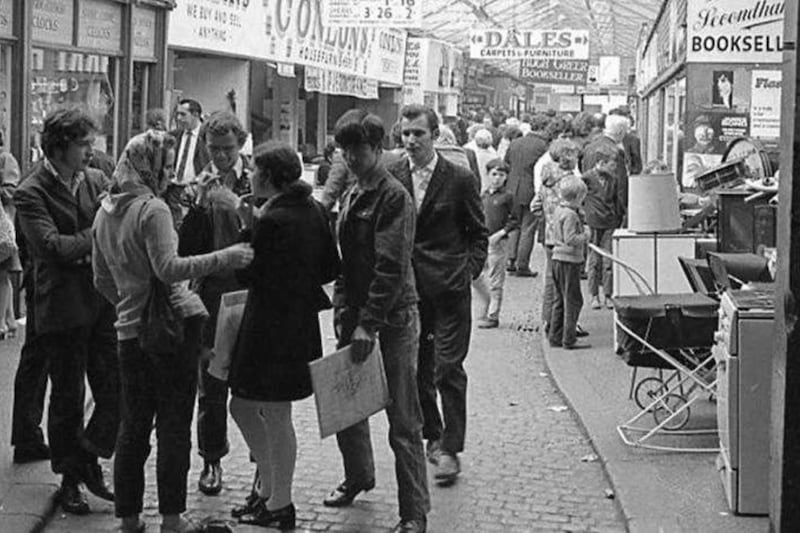Go mbeannaí Dia daoibh, greetings Gael and Gall, agus bhur gcéad fáilte isteach chuig The Bluffer’s Guide to Irish.
We’re going to finish parts of the body today having spend a fortnight getting as far as the head!
The thing that keeps the head connected to your body is anmuineál - the neck.
Now some people have necks that are are made of pure brass and you could say tá muineál práis air - he has a brass neck but people would be more impressed if you said bhí sé de dhánacht ann - he had the brass neck to ...
The neck is connected to the guailneacha - the shoulders. (One shoulder is gualainn as in the phrase gualainn ar ghualainn - shoulder to shoulder.
(Has anyone ever translated Ireland’s Call to Irish? Thankful for little mercies!)
At the sides of your shoulder hanging limply down as if you were at a céilí in the 1960í are your lámha - arms.
Now in Irish lámha are both arms and hands and it hasn’t done us any harm that I can think of.
There is another word, sciatháin which more often means wings but as haven’t learned to fly yet, we’ll stick to lámha.
On the hands we have méara - fingers which God gave us because he foresaw the use of gutháin chliste - smart phones and cans of beer.
However, we do have a word for the elbow and it is uilleann, famous for the pipes, but it also means an angle.
Now to the body.
Colainn is a body but the word most used is corp as in corp agus anam - body and soul.
Brollach is the chest as in tá pian i mo bhrollach - I have a pain in my chest.
Below that again is the bolg - the stomach or in the case of the Bluffer, the sé-phaca - the six pack (he wishes!)
Round the other side, you will find an droim - the back.
You’ll forgive the Bluffer if he skips the bits that Adam and Eve covered with leaves as this is a family newspaper and he’s rather not disturb you over your Corn Flakes.
Cosa are both feet and legs so tá cosa móra air - he has big feet.
(The Bluffer really likes Ralph Waldo Emerson’s quote, that “In the morning a man walks with his whole body; in the evening, only with his legs.”
It really captures the energy of the morning with the lethargy of the evening.)
Glúin is a knee and glúine are knees and ladhracha are toesm the plural of ladhar.
Have you noticed that parts of the body are on people? Tá lámha beaga uirthi (not aici) - she has small hands. Tá gaosán mór air - he has a big nose.
We’ll leave the internal organs until another time.
The Bluffer's getting more in touch with his body since he took to the gym and the above will be of great use when telling your traenalaí pearsanta - personal trainer where exactly the pain is.
In yoga, part of the plan is to concentrate on each part of the body while breathing deeply and yes, you can do yoga in Irish.
Or you can play games with your kids if they are young enough describing the different parts of the body.
Good luck/Ádh mór.
CÚPLA FOCAL
muineál (mwinyaal) - the neck
tá muineál práis air (taa mwinyaal praash er) - he has a brass neck
bhí sé de dhánacht ann (vee shay de gaanakht un) - he had the brass neck to ...
guailneacha (gooilnyakha) - the shoulders
gualainn ar ghualainn (gooalin er gooalin) - shoulder to shoulder
lámha (laowa) - arms
sciatháin (shkeeahaan) - wings
méara (mayra) - fingers
uilleann (illin) - elbow
colainn/corp (colin/ corp) - body
corp agus anam (corp agis anam) - body and soul
brollach (brollakh) - chest
tá pian i mo bhrollach (taa peean i maw wrollakh) - I have a pain in my chest
an droim (un drim) - the back
bolg (bolog) - the stomach
sé-phaca (shay-faca) - the six pack
tá cosa móra air (taa cussa mora er) - he has big feet
Glúin (gloon) - a knee
glúine (gloonye)- knees
ladhracha (layraha) - toes
tá lámha beaga uirthi (taa laowa biga erhee) - she has small hands
Tá gaosán mór air (taa geesaan more er) - he has a big nose
traenalaí pearsanta (traynalee paarsanta) - personal trainer



